FY2022 Annual Report
Quantum Machines Unit
Professor Jason Twamley

Abstract
The Quantum Machines Unit undertakes research focused on hybrid quantum systems –which brings together two or more quantum systems to function together to perform some useful action, e.g. developing ultra-precise sensors, exploring fundamental issues in quantum science, or quantum information processing. We are interested in questions like: can we build table-top setups to explore the interaction of gravity with the quantum world? Can we build table-top setups to search for gravitational waves? Can we generate a Schrodinger cat in a massive particle – splitting the particle to exist in two places at once? Towards answering these questions the Quantum Machines Unit focuses on two primary tools: cavity optomechanics and magnetically levitated quantum systems. Cavity optomechanics involves optical cavities which involve optical elements which can move, e.g. a moving mirror. Optomechanics research has rapidly evolved into a large and dynamic research topic, developing new types of sensors and the cooling of small particles to their motional ground state. Diamagnetic levitation permits one to levitate quite large particles where one seeks to control the dynamics of individual and multiple particles using a variety of methods including real-time feedback control using optical and electromagnetic forces. Diamagnetic levitation requires no active power and is expected to exhibit very low levels of motional noise. The Quantum Machines Unit combines theory with experiment to develop these tools towards addressing the broader questions above.
Over the past year the Unit has had visitors from Australia [Prof J. Downes, Prof. J. Wang], Gakushuin University in Tokyo [A/Prof M. Fuwa], Osaka University [A/Prof Y. Minowa], and Prof R. Zhang from Nanjing University who is visiting the Unit for a year courtesy of the National Science Foundation of China. The Unit also hosted a number of intern students from a variety of countries including Australia, Mexico and India. Prof Wang’s JSPS hosted visit led to a number of lectures held at OIST and a Public Lecture in Okinawa City which was well attended despite the COVID situation. The Unit participated in helping to organise an international workshop on the Quantum Engineering of Levitated Systems (QELS), in the lovely hillside town of Benasque, in northern Spain, where many experts participated from all over the world on the topic of levitated quantum systems. The group also participated in the large international conference for Low Temperature 29, held in Sapporo in Japan in August 2022 and our PhD student T. Iakolvleva won a prize for best poster. Members of the Unit gave seminars both in Japan and elsewhere, particularly in Australia, building links with experimental and theory groups working on solid-state, optomechanics, gravity-wave and quantum algorithms within Australia. Prof Twamley gave an invited talk at the bi-annual Australian Physics Congress which was held in Adelaide in December 2022. The Unit published its first experimental paper on controlling the diamagnetic levitation of graphite plates and this was well received within the global levitation community. Experiments within the Quantum Machine Unit are expanding to include diamagnetic levitation of other materials including liquids, as well as investigating the science of optical whispering gallery modes for potential use in sensing and nonlinear optics.
1. Group Members
Staffing for FY2022
- Prof. Jason Twamley, Professor
- Dr. Fernando Quijandria, Staff Scientist
- Dr. Mohamed Hatifi, Postdoctoral Scholar
- Dr. Krishna Jadeja, Postdoctoral Scholar
- Dr. Ruvi Lecamwasam, Postdoctoral Scholar
- Dr. Kani Mohammed, Postdoctoral Scholar
- Dr. Shilu Tian, Postdoctoral Scholar
- Tatiana Iakovleva, Graduate Student
- Daehee Kim, Graduate Student
- Camila Patricia Cusicanqui Padilla, Research Intern
- Deepthi Parandhaman Gowrappan, Research Intern
- Samuel Begumya, Graduate Student (rotation Term 3 AY2022)
- Zhenghan Yuan, Graduate Student (rotation Term 3 AY2022)
- Prof. Rong Zhang, Research Fellow
- Miwa Matsui, Research Administrator
Yet to join
- Shuma Oya, Graduate Student (rotation Term 1 AY2023)
- Savelii Dudoladov, Graduate Student (rotation Term 2 AY2023)
- Dr. JinJin Du, Experimental Staff Scientist (July 2023)
- Dr. Anil Kumar, Theoretical Staff Scientist (July 2023)
Alumni
- Dr. Yanan Liu, Postdoctoral Scholar (Mar 2021-May 2022)
- Dr. Priscila Romagnoli, Postdoctoral Scholar (Sep 2020-Jul 2022)
- Dr. Sangkha Borah, Postdoctoral Scholar (Aug 2020-Nov 2022)
- Dr. Bijita Sarma, Postdoctoral Scholar (Jan 2021-Nov 2022)
- Andreas Raikos, Research Intern (Nov 2022-Mar 2023)
- Christopher Alan Arden Wise, Research Intern (Jan-Apr 2023)
- Raul Alejandro Hidalgo Sacoto, Graduate Student (rotation Term 3 AY2021)
- Amal Jose, Graduate Student (rotation Term 3 AY2021)
- Alexander Hodges Graduate Student (rotation Term 1 AY2022)
- Anshuman Nayak Graduate Student (rotation Term 2 AY2022)
- Sougato Chowdhury Graduate Student (rotation Term 2 AY2022)
- Prof. Jingbo Wang, Visiting JSPS Professorial Fellow (Jun-Jul 2022)
2. Collaborations
- Type of collaboration: Joint research
- Researchers:
- Prof Thomas Busch, Okinawa Institute for Science and Technology, Okinawa, Japan
- Prof Ivan Deutsch, University of New Mexico, Albquerque, New Mexico, USA
- Prof James Downes, Prof Dave Spence, Prof Gavin Brennen, Dr Cyril Laplane, Macquarie University, Sydney, Australia
- Prof Nobuyuki Matsumoto, Dr Maria Fuwa, Gakushuin University, Tokyo, Japan
- Prof Gerard J. Milburn, University of Queensland, Queensland, Australia
- Dr William J Munro, Quantum Science and Technology Laboratory, NTT Basic Research Labs, Atsugi, Kanagawa, Japan
- Prof Yosuke Minowa, Osaka University, Japan
- Prof Jingbo Wang, Dr Maxim Goryachev, University of Western Australia, Perth, Australia
- Prof Gabriel Hetet, Ecole Normale Superieure, Paris, France
3. Activities and Findings
3.1 Controlling Q factor of a diamagnetically levitated graphite plate
Levitation isolates systems from the environment, which allows us to create macroscopic quantum states, and answer fundamental questions about the nature of quantum physics and gravity. Recently there has been increasing interest in diamagnetic levitation, where diamagnetic materials are repelled by magnetic fields. While the optical methods are limited to objects below micrometer size, diamagnetic levitation has been used to lift frogs and even trains. Moreover, it can work in a completely passive way if permanent magnets are used, and it requires no active energy input or time-varying fields which would introduce noise and heating that could destroy quantum states.
One of the most strongly diamagnetic materials is Highly Oriented Pyrolytic Graphite (HOPG), and centimeter-sized slabs can easily be levitated over a checkerboard array of permanent magnets. However, since graphite is a good electrical conductor, as it moves over the magnets, eddy currents are created which strongly dampens its motion and causes heating. These currents are the greatest challenge to the use of HOPG to create quantum levitated systems, and the community is actively researching methods to eliminate them. However, if controlled, the eddy currents could also be useful, as they can stabilize and suppress the excess motion of the plate.
In this experiment, we were able to control the eddy currents by cutting circular patterns with narrow slots into the graphite to interrupt the current flow. This could reduce the damping by a factor of 40, quantified by an increase in the resonator Q factor from around 65 to 2500. By increasing the slot density and/or optimizing the slot patterns, it's possible to get a higher Q factor. Moreover, these experimental results matched very closely with simulations, suggesting that we could engineer geometries whose currents flow in a useful way, without losing the structural integrity and diamagnetic levitation strength.
Diamagnetic levitation is a new field, with a unique potential to levitate large systems with minimal noise and interference. Our work shows how one of the greatest challenges to these systems can be suppressed and even controlled, paving the way towards the achievement of macroscopic quantum states, and investigations into the fundamental nature of quantum mechanics.

Figure: Graphite levitation setup, and eddy current and Q factors of graphite resonators with different slot densities. (a)-(d) The simulated eddy current decreases with the increase of slot density from N=0 to N=8. The black circular patterns indicate the carved slots, and the arrows and the color show the direction and strength of the eddy current density. (e) A 10*10*1 mm graphite slab levitates above a checkerboard array of NdFeB magnets. (f) The Q factors of the resonators relative to the uncut one. Both the simulations and experiment show the increase of the Q factor with the increase of slot density.
Video: Oscillation of the graphite resonator in high vacuum.
3.2 Spinning up magnonic spheres to ultra-fast speeds
We are all used to motors, electric, gasoline, etc and they are all based on generating rotary motion. So what is the ultimate limit of rotational speed? How fast can one rotate an object and how to realistically achieve it? This topic of research has a long history. Researchers can generate really fast rotation using motors with levitated (or almost levitated) armatures, but since the last decade researchers have focused on using light to spin tiny nanoscopic objects which are levitated in high vacuum. Using a vacuum reduces the rotational drag and they were able to experimentally achieve rotational speeds of a GHz or so. In recent theoretical work we focused on studying this problem in a levitated ferromagnetic sphere made from a crystalline magnetic material called YIG. In YIG one has room temperature quantum excitations known as magnons and we found a family of magnons which have both spin and orbital angular momentum. So if we excite these types of magnons using microwaves with no net angular momentum the crystal gets the opposite angular momentum due to conservation of angular momentum….and so the levitated crystalline sphere will start to rotate. We showed that by tuning the microwave field we can theoretically achieve incredible rotational speeds – and even for very large YIG spheres. We had great fun investigating this project and learned about novel phenomena- one called the Einstein de-Haas effect (where the magnetization of a magnet causes the magnet to rotate), and the Barnet effect (where the spins in an rotating object perceive a magnetic field in their rotating frame) [Phys Rev Lett 129, 257201 (2022)].
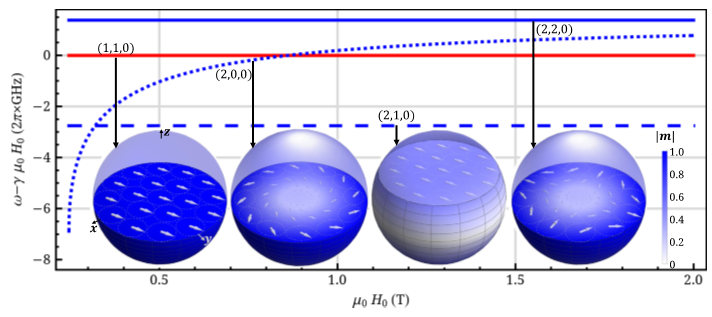
4. Publications
4.1 Journals
-
Hillmann, T., Quijandria, F.
Quantum error correction with dissipatively stabilized squeezed-cat qubits
Phys Rev A 107, 032423 (2023) -
Romagnoli, P., Lecamwasam, R., Tian, S., Downes, JE., Twamley, J.
Controlling the motional quality factor of a diamagnetically levitated graphite plate
Appl Phys Lett 122, 049102 (2023) -
Kani, A., Quijandria, F. and Twamley, J.
Magnonic Einstein–de Haas Effect: Ultrafast Rotation of Magnonic Microspheres
Phys Rev Lett 129, 257201 (2022) -
Sarma,B., Borah, S., Kani, A., and Twamley J.
Accelerated motional cooling with deep reinforcement learning
Phys. Rev. Research 4, L042038 (2022) -
Liu, Y., Dong, D., Petersen, IR., Gao, Q., Ding, SX., Yokoyama, S., and Yonezawa, H.
Fault-Tolerant Coherent H∞ Control for Linear Quantum Systems
IEEE TRANSACTIONS ON AUTOMATIC CONTROL, 67, 5087 (2022) -
Qin, JY, Guccione, G, Ma, JY, Gu, CY, Lecamwasam, R, Buchler, B, Lam, PK,
Cancellation of photothermally induced instability in an optical resonator
Optica 9, 924 (2022) -
Kudra, M., Kervinen, M., Strandberg, I., Ahmed, S., Scigliuzzo, M., Osman, A., Lozano, DP., Tholén, MO. Borgani, R., Haviland, D., Ferrini, G., Bylander, J., Kockum, AF., Quijandría, F., Delsing, P. and Gasparinetti, S.
Robust Preparation of Wigner-Negative States with Optimized SNAP-Displacement Sequences
PRX Quantum 3, 030301 (2022) -
Hillmann, T., Quijandría, F., Grimsmo, AL., and Ferrini, G.
Performance of Teleportation-Based Error-Correction Circuits for Bosonic Codes with Noisy Measurements
PRX Quantum 3, 020334 (2022) -
Borah, S., Sarma, B., Kewming, M., Quijandría, F., Milburn, G.J. and Twamley, J.
Measurement-based estimator scheme for continuous quantum error correction
Phys. Rev. Research 4, 033207 (2022) -
Hillmann, T. and Quijandría, F.
Designing Kerr Interactions for Quantum Information Processing via Counterrotating Terms of Asymmetric Josephson-Junction Loops
Phys. Rev. Applied 17, 064018 (2022) -
Li, G., Liu, Y., Kuang, S., and Xiang, C.
Approximate bang-bang control assisted rapid switching feedback stabilization for stochastic qubit systems
J. Franklin Inst. 359, 2073 (2022). -
Kani, A., Sarma, B. and Twamley, J.
Intensive Cavity-Magnomechanical cooling of a levitated macromagnet
Phys Rev Lett 128, 013602 (2022) -
Kuang, S., Li, G., Liu, Y., Cong, S.
Rapid Feedback Stabilization of Quantum Systems with Application to Preparation of Multiqubit Entangled States
IEEE Trans on Cybernetics 52, 2168 (2022)
4.2 Books and other one-time publications
Nothing to report
4.3 Oral and Poster Presentations
-
Invited Talk: J.Twamley: “Quantum Engineering with Levitated Systems,” Australian Institute of Physics Congress, Dec 15 2022
-
Poster: S. Tian: " Generation of Macroscopic Quantum Motional Superpositions using Superconducting Quantum Circuits,” Quantum Engineering of Levitated Systems Conference, Benasque, Spain, April 24-30, 2022
-
Poster: R. Lecamwasam: “Boosting Optomechanical Coupling with a Bragg Mirror,” Quantum Engineering of Levitated Systems Conference, Benasque, Spain, Apr 27, 2022
-
Poster: F.Quijandria: "Automatic self-correcting quantum spin systems," The 29th International Conference on Low Temperature Physics - LT29, Sapporo, Japan, Aug 18-24, 2022
-
Poster: A. Kani, B. Sarma, F. Quijandría, and J. Twamley: “Cooling of massive objects to their motional ground state and engineering ultra-fast rotation,” The 29th International Conference on Low Temperature Physics - LT29, Sapporo, Japan, Aug 18-24, 2022
-
Poster: B. Sarma: “Accelerated motional cooling with deep reinforcement learning,” The 29th International Conference on Low Temperature Physics - LT29, Sapporo, Japan, Aug 18-24, 2022
-
Poster: S. Borah: “MBE-CQEC: A new method for continuous quantum error correction,” The 29th International Conference on Low Temperature Physics - LT29, Sapporo, Japan, Aug 18-24, 2022
-
Poster: T. Iakovleva: “Ultra-precise distance measurement in an optomechanical system,” The 29th International Conference on Low Temperature Physics - LT29, Sapporo, Japan, Aug 18-24, 2022
-
Poster: R. Lecamwasam: “Boosting optomechanical coupling with a Bragg Mirror,” The 29th International Conference on Low Temperature Physics - LT29, Sapporo, Japan, Aug 18-24, 2022
-
Poster: Y. Liu: “Quantum self-oscillation with time-delay feedback,” The 29th International Conference on Low Temperature Physics - LT29, Sapporo, Japan, Aug 18-24, 2022
-
Poster: S. Tian: “Generation of Macroscopic Quantum Motional Superpositions using Superconducting Quantum Circuits,” The 29th International Conference on Low Temperature Physics - LT29, Sapporo, Japan, Aug 18-24, 2022
-
Poster: A. Kani, B. Sarma, F. Quijandria, and J. Twamley, “Cooling of massive objects to their motional ground state and engineering ultra-fast rotation,” OCQT Mini Symposium, at OIST, Nov 9, 2022
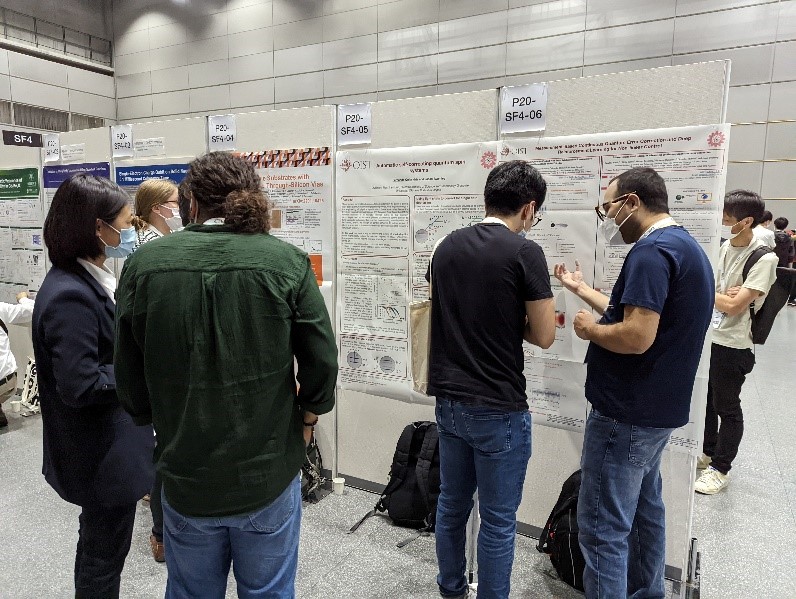
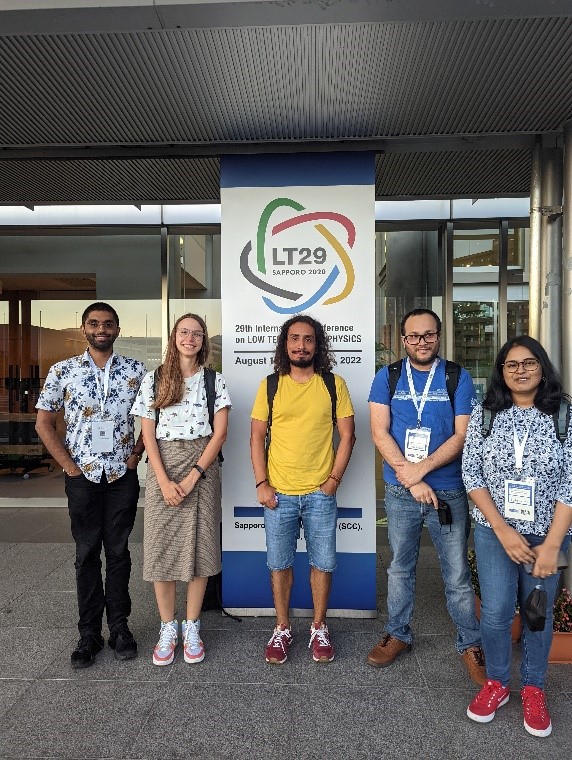
5. Intellectual Property Rights and Other Specific Achievements
- USA provisional filing for a patent on Automatic Self-Correcting Quantum Systems: F. Quijandria and J. Twamley, Aug 5, 2022
- Patent Cooperation Treaty filing of a design for a Magnetic Lens: D. Kim, M. Couillard and J. Twamley, Jan 5, 2023
6. Meetings and Events
6.1 Seminars
1. Dr. Ruvi Lecamwasam, OIST
- Title: Coherently-levitated & Frequency-dependent optomechanics
- Date: May 5, 2022
- Venue: King's College London
2. Prof. Jingbo Wang, University of Western Australia
- Title: Quantum Computation
- Lecture 1: Quantum Computing Fundamentals (postulates of quantum mechanics; quantum bits, gates, and circuits)
- Date: June 7, 2022
- Time: 08:45
- Venue: OIST
- Seminar details: https://groups.oist.jp/qmech/event/quantum-computation-lecture-1-quantum-computing-fundamentals-postulates-quantum
3. Prof. Jingbo Wang, University of Western Australia
- Title: Quantum Computation
- Lecture 2: Physical Implementation of Quantum Gates and Circuits (evolving the quantum computer governed by Schrödinger’s equation)
- Date: June 9, 2022
- Time: 09:00
- Venue: OIST
- Seminar details: https://groups.oist.jp/qmech/event/quantum-computation-lecture-2-physical-implementation-quantum-gates-and-circuits
4. Prof. Jingbo Wang, University of Western Australia
- Title: Quantum Computation
- Lecture 3: Quantum Teleportation and Superdense Coding (demonstrating quantum advantages)
- Date: June 14, 2022
- Time: 09:00
- Venue: OIST
- Seminar details: https://groups.oist.jp/qmech/event/quantum-computation-lecture-3-quantum-teleportation-and-superdense-coding-demonstrating
5. Prof. Jingbo Wang, University of Western Australia
- Title: Quantum Computation
- Lecture 4: Shor’s Factorization Algorithm (quantum arithmetic and logic; quantum Fourier transformation)
- Date: June 16, 2022
- Time: 09:00
- Venue: OIST
- Seminar details: https://groups.oist.jp/qmech/event/quantum-computation-lecture-4-shor%E2%80%99s-factorization-algorithm-quantum-arithmetic-and
6. Prof. Jingbo Wang, University of Western Australia
- Title: Quantum Computation
- Lecture 5: Grover’s Search Algorithm (amplitude amplification) and Quantum Error Correction
- Date: June 21, 2022
- Time: 09:00
- Venue: OIST
- Seminar details: https://groups.oist.jp/qmech/event/quantum-computation-lecture-5-grover%E2%80%99s-quantum-search-algorithm-amplitude-amplification
7. Prof. Jingbo Wang, University of Western Australia
- Title: Quantum Computation
- Lecture 6: Quantum Optimisation (practical applications)
- Date: June 23, 2022
- Time: 09:00
- Venue: OIST
- Seminar details: https://groups.oist.jp/qmech/event/quantum-computation-lecture-6-quantum-cryptography-and-quantum-bit-commitment
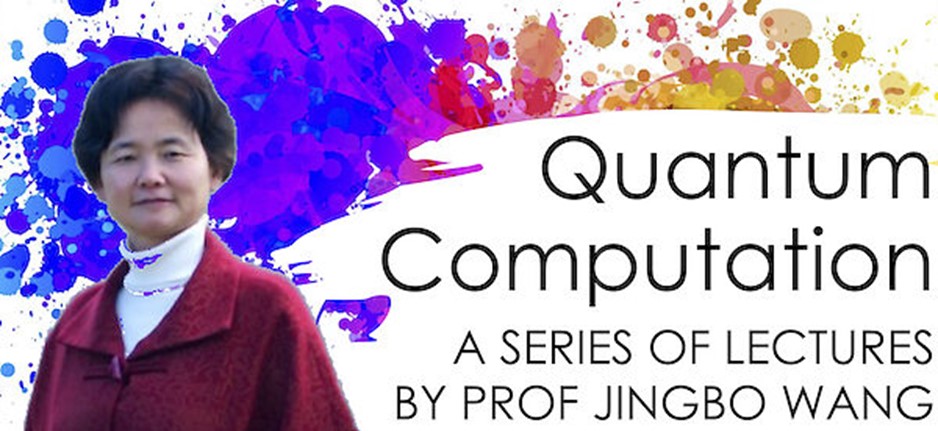
8. Prof. Peter S. Turner, Sydney Quantum Academy and Macquarie University
- Title: On the quantum information of quantum interference
- Date: June 16, 2022
- Time: 10:00
- Venue: OIST
- Seminar details: https://groups.oist.jp/qmech/event/seminar-quantum-information-quantum-interference

9. Prof. Jason Twamley, OIST
- Title: Levitated Quantum Systems
- Date: August 25, 2022
- Venue: Macquarie University, Sydney, Australia, at the Centre for Quantum Engineering
10. Prof. Jason Twamley, OIST
- Title: Quantum Machines – a Journey with Friends
- Date: August 25, 2022
- Venue: Sydney Quantum Academy, Sydney, Australia
11. Dr. Fernando Dr. Fernando Quijandria, OIST
- Title: Self-correcting qubits
- Date: September 13, 2022
- Venue: Australian National University, Canberra, Australia
12. Prof. Jason Twamley, OIST
- Title: Quantum Optics and Information Processing
- Date: September 27-29, 2022
- Venue: University of Western Australia, Australia, at the Institute for Advanced Studies
13. Associate Professor Witlef Wieczoref, Chalmers University of Technology
- Title: Magnetic levitation of superconducting microparticles on a chip
- Date: December 19, 2022
- Time: 16:30
- Venue: OIST
- Seminar details: https://groups.oist.jp/qmech/event/seminar-magnetic-levitation-superconducting-microparticles-chip
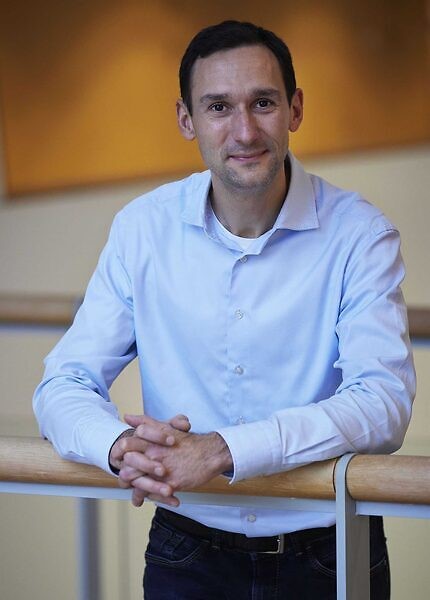
14. Dr. Jinjin Du, National University of Singapore
- Title: Fast imaging of individual impurities in an atomic gas
- Date: January 6, 2023
- Time: 10:00
- Venue: OIST
- Seminar details: https://groups.oist.jp/qmech/event/fast-imaging-individual-impurities-atomic-gas
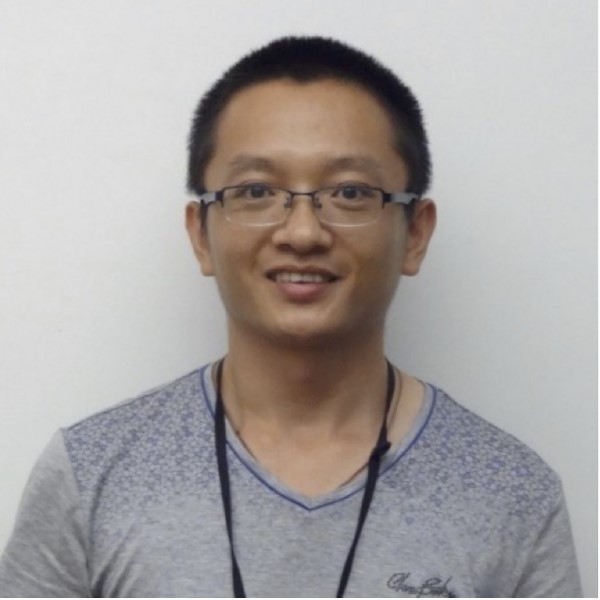
15. Dr. V Kavungal, Technological University Dublin, Ireland
- Title: Whispering Gallery Mode (WGM) microresonators for sensing applications
- Date: January 13, 2023
- Time: 16:00
- Venue: OIST
- Seminar details: https://groups.oist.jp/qmech/event/whispering-gallery-mode-wgm-microresonators-sensing-applications-dr-v-kavungal

16. Dr. Glen Harris, University of Queensland
- Title: Optomechanics with levitated liquid Helium
- Date: January 20, 2023
- Time: 10:00
- Venue: OIST
- Seminar details: https://groups.oist.jp/qmech/event/optomechanics-levitated-liquid-helium
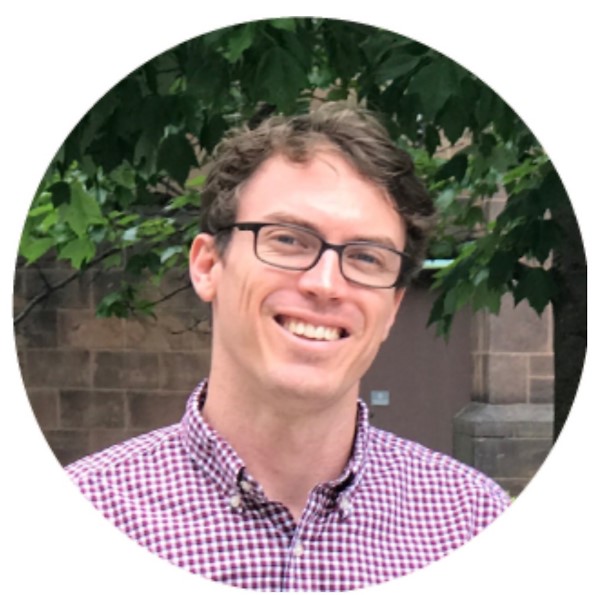
17. Dr. Zixin Huang, Macquarie Centre for Quantum Engineering
- Title: Sub-wavelength quantum imaging for astronomy
- Date: February 2, 2023
- Time: 10:00
- Venue: OIST
- Seminar details: https://groups.oist.jp/qmech/event/sub-wavelength-quantum-imaging-astronomy
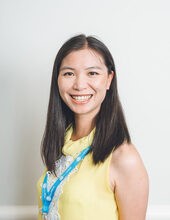
18. Dr. Kani Mohamed, OIST
- Title: Magnonic Einstein–de Haas Effect
- Date: February 7, 2023
- Venue: University of Duisburg-Essen, Germany [zoom]
19. Prof. Andrew Doherty, The University of Sydney
- Title: Gottesman-Kitaev-Preskill Codes as Subsystems
- Date: February 10, 2023
- Time: 10:00
- Venue: OIST
- Seminar details: https://groups.oist.jp/qmech/event/seminar-gottesman-kitaev-preskill-codes-subsystems
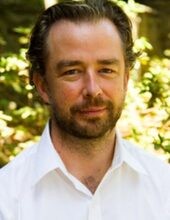
20. Dr. Fernando Dr. Fernando Quijandria, OIST
- Title: Quantum error correction with dissipatively stabilized squeezed cat qubits
- Date: February 16, 2023
- Time: 10:00
- Venue: OIST
- Seminar details: https://groups.oist.jp/qmech/event/quantum-error-correction-dissipatively-stabilized-squeezed-cat-qubits
21. Prof. Jason Twamley, OIST
- Title: Engineered Quantum Machines – mechanics and spin control
- Date: March 2, 2023
- Venue: Technical University of Delft, Holland, at the Department of Dynamics of Micro and Nanosystems
7. Other
7.1 Events
- Organisation of the International Workshop on Levitated Quantum Systems in Benasque: Bringing over 80 participants from all over the world to discuss for a week the science of levitated quantum systems. Attending from OIST were Prof J. Twamley [co-organiser], Dr R. Lecamwasam, Dr S. Tian.
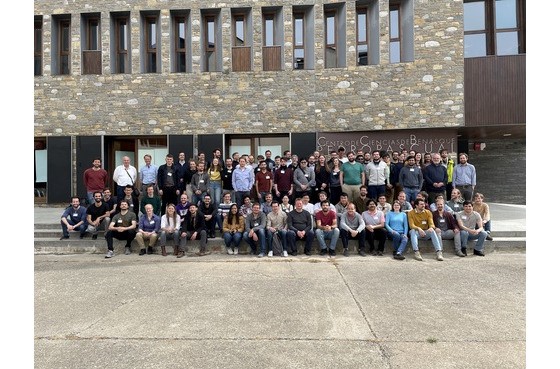
- October 20, 2022: Visit by Start-up Company developing novel nanoscale scanning magnetometry microscopes
https://groups.oist.jp/qmech/event/visit-startup-company-developing-novel-nanoscale-scanning-magnetometry-microscopes
Speaker: QNAMI, Switzerland
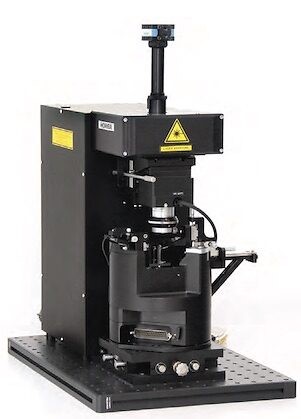
7.2 Community Outreach Activities
- June 7, 2022: Demonstration given at the Onna × OIST Children's School of Science by Dr. Ruvi Lecamwasam.
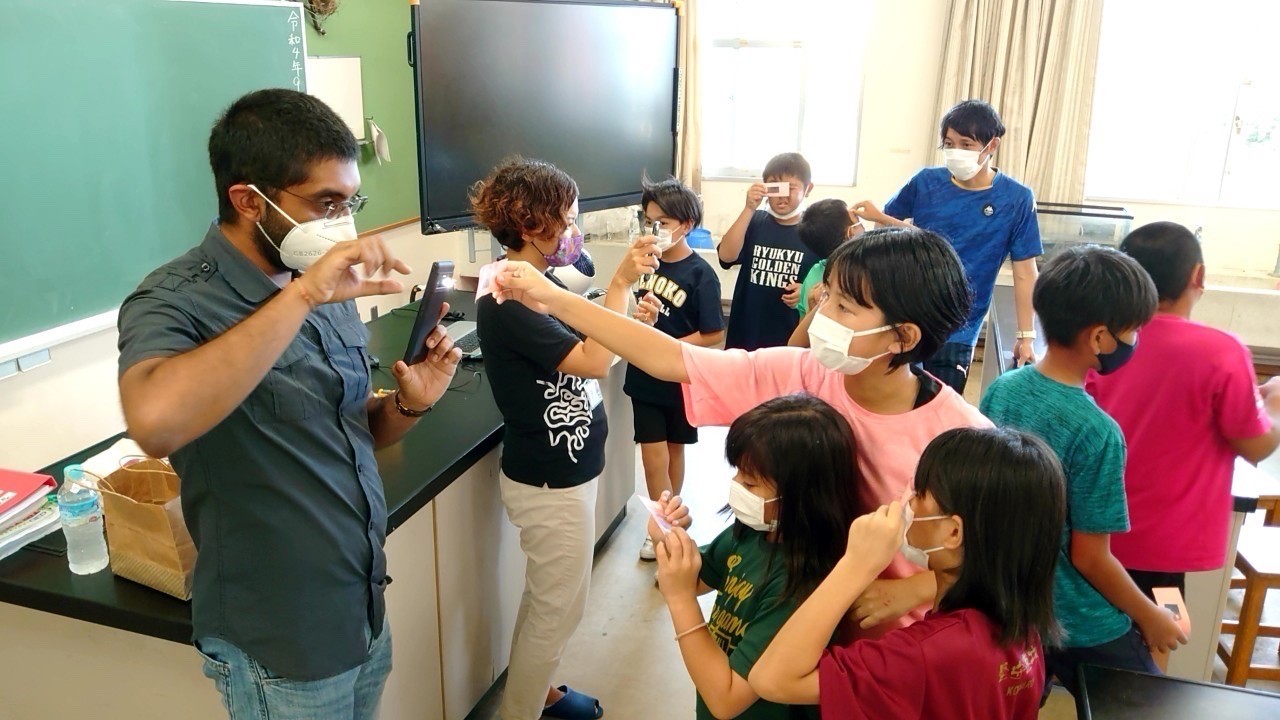

- July 9, 2022: Public Talk entitled: Quantum Computers: How fantastic will they really be?
https://groups.oist.jp/qmech/event/public-talk-quantum-computers-how-fantastic-will-they-really-be
Speaker: Professor Jingbo Wang (University of Western Australia)
Venue: Okinawa City Public Entertainments Mansion Hall
(Cultural Center Floor 4, 2-19-6 Uechi Okinawa City 904-0031)
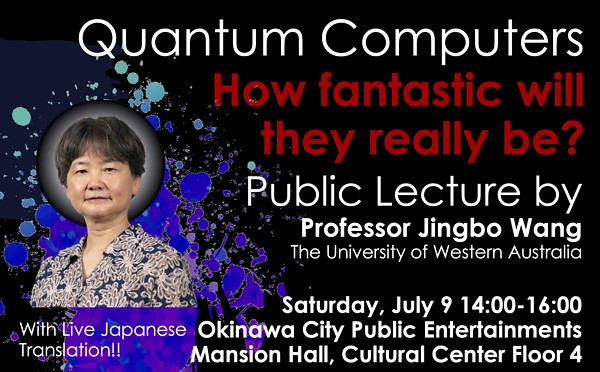
- April 20, 2023: Outreach at the AmerAsian highschool in Ginowan by Dr. Krishna Jadeja
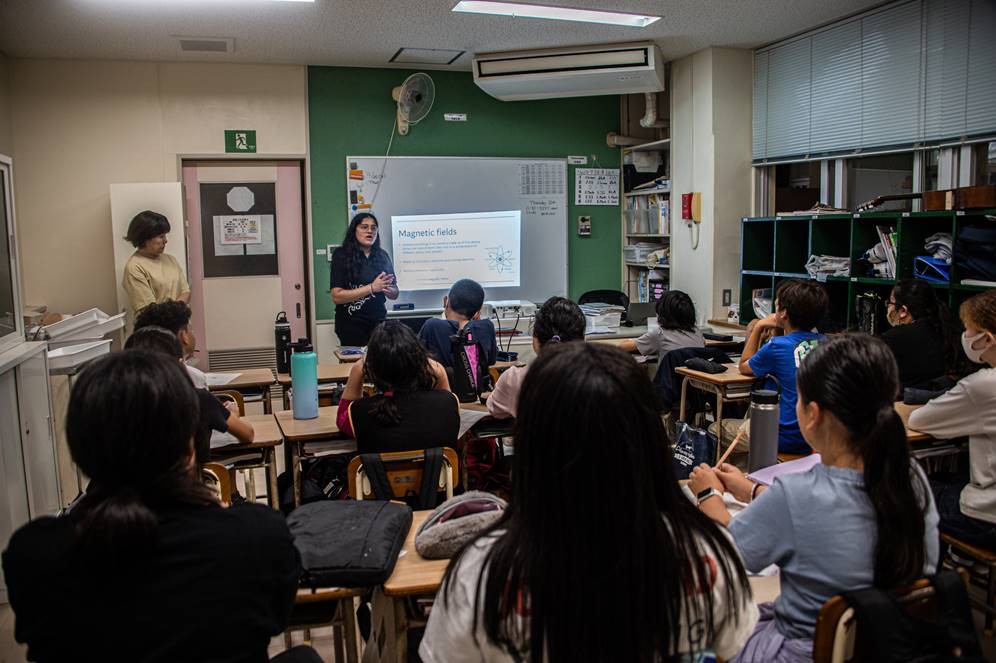
- The Unit has built online tutorials (R. Lecamwasam, A. Hodges, D. Kim), on developing code for the Red Pitaya FPGA
https://github.com/exuperian/RedPitayaTutorials



